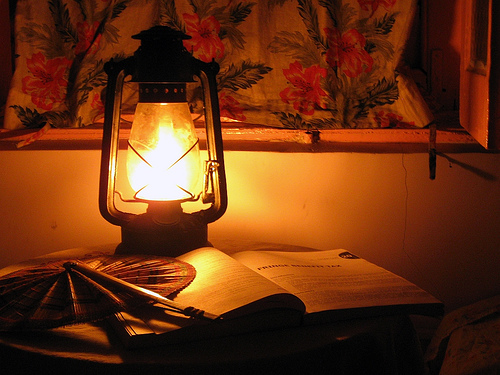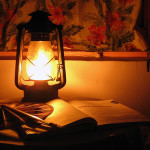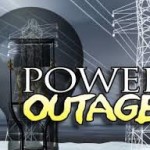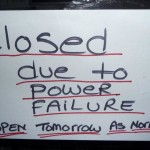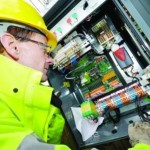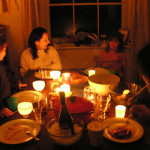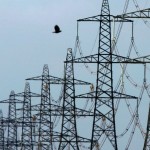“You don’t need a weatherman to know which way the wind blows” – Bob Dylan
With storms and 80mph winds forecast, apparently the worst since 1987, Adam and I went to our respective beds last night expecting to wake and find flying fence panels, slate tiles in the road, trees crashing down over cars and other such minor disasters.
But no, from Adam’s perspective it was far, far worse: the power was down for several hours. At such moments you realise how totally dependent our first world lives are on the availability of electricity. Without it he (and I) were deprived of lights, TV, Internet and appliances, which left him bereft of any contact with his Facebook and Twitter accounts and therefore invisible to the world. Luckily the Aga was still on, so I could make coffee and cook breakfast to tide us over until the lights came back on.
A return to medieval times, almost. Adam had candles on, even for that relatively short outage, though he stopped short of reading a book, preferring instead to go for games on his mobile, while the charge lasted.
However, this enforced quiet interlude did give me time to wonder what would happen if, as in war zones and countries with true natural disasters, power vanished for days, weeks at a time. No labour-saving devices, all the food in the freezer ruined and having to be eaten up, supermarkets stocked with tinned goods rather than fresh, washing clothes and dishes by hand, washing without the benefit of power showers, telephones down because the cordless base units need powering… and many more examples.
Electric cookers would be as good as useless, so areas without gas or alternative sources of fuel would presumably have to club together and cook over bonfires or barbecues, at least while the weather was decent, but then eat fresh fruit and cereal. This does take me back to the power cuts of 1973, when we all responded with characteristic resolve and resourcefulness. I found myself cooking spaghetti bolognaise on a primus stove by torchlight and lantern. Ah, them were the days.
But a power outage lasting for a significant period might concentrate our minds in the search for renewable energy sources, for sure but that would be scant consolation in the short term. This would be the surest way to ensure the generally laid back British were up in arms, since anything disturbing our general convenience and way of life makes us mad! A mutiny of complaints and demonstrations about the loss of power would undoubtedly follow, to which the government would react by setting up a network of power generators in every street and providing meals on wheels to those who needed them.
Of course, we take our electricity very much for granted. We assume it will always be there, such that our home lives are predicated on the assumption power will be available 24 x 7. The only people who think ahead and take precautions in the event that power are those that live in the back of beyond (for whom a generator is probably an economic proposition), or those who have taken advantage of government grants to install their own solar panels, wind turbines or other forms of personal or community power generation, which sounds a bit like a return to the days when we needed to co-operate with the people around us in order to survive. For example, if it meant pooling waste resources in order to generate methane gas from which to cook, you can imagine communities rallying round and doing that. So long as the solution is practical and achievable, a local response is indeed possible.
So it’s not beyond the realms of possibility that we could be all doing our own power generation in future, particularly if the cost of electricity and gas continues to surge and MPs try to flog the rights to build nuclear plants to the Chinese. How high does the price have to get before we think to ourselves that buying into alternatives on a grand scale becomes justifiable?
Actually, the failure of governments and energy companies to deliver a sustainable and affordable strategy suggests to me that option, with local communities taking matters into their own hands, is looking all the more realistic. A sort of genteel user-led anarchy, which consumer power is no bad thing if it makes the relevant authorities, elected or otherwise, realise they have to put the consumer first and not the interests of shareholder-led corporates.
Perhaps the most important point here is that some genuine consumer self-help and power will make the government and companies realise they have to work much, much harder to give us what we need. It is we who are important, and we who have generally been shat upon from a great height. But there again, I guess that would be one miracle too far.
Cor blimey, shine a light!

